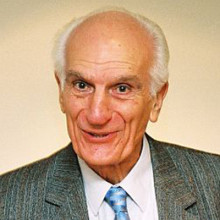Polish literature

Marian Pankowski
(b. 1919) – poet, prose-writer, playwright, literary critic, literature historian, translator, and retired professor at the Université Libre in Brussels. He received the Gdynia Literary Award 2008 in the Prose category for his book The Angels’ Last Rally.
Marian Pankowski made his debut in the literary press in 1938, and took up Polish studies at the Jagiellonian University. He participated in the 1939 Defensive War, and in the times of the German occupation he was arrested and placed in a concentration camp. After the war he settled in Belgium; since 1958 he has published in Poland as well. He writes in Polish and in French. Marian Pankowski’s literary output seems it should have taken several lifetimes to produce. He is doubtless one of Poland’s most interesting and unacknowledged writers living and working abroad. The reception of his work in Poland has gone through a few phases. At the end of the 50s, Pankowski was part of a group of émigré authors who were officially allowed to publish some of their books in Poland. Pankowski’s boldest works – both in terms of politics and drama – made their appearance only in the 80s, included his most impressive prose pieces: Matuga Is Coming, Pilgrims from the Motherland and Rudolf. Somewhat later, an interest in Pankowski’s work for the theater came about. The next stage of interest came about at the beginning of the 21st century. The most vital event here was the reissue of the novel Rudolf. Given that Pankowski has a proclivity for delicate issues, even those bordering on scandalous – he has become one of the patrons of the young generation of Polish writers, a kind of icon of the critical, unflinching and cocksure writer. Of all the genres he works in, Marian Pankowski’s prose is most highly esteemed. A few superb titles published in the last few years stand out – above all the disarming and compelling mini-novel entitled From Auschwitz to Belsen. After 50 years, the author returned to experiences from his time in Nazi concentration camps. This is not, however, a memoir, or a tale of martyrdom; it is an attempt to reconstruct the consciousness of a prisoner who was still young at the time. What took place behind the barbed wire is conceived in terms of a bizarre language game, by turns terrifying and fascinating. Equally intriguing – though for other reasons – are two volumes of prose in which Pankowski deals with the topic of love among the elderly. Lovers in the autumn of their lives appear in two stories in the book Love's Way, as well as in the novella The Widows’ and Widowers’ Ball.
BIBLIOGRAPHY (SELECTED)
- Powrót białych nietoperzy [powieść], Lublin: Wydawnictwo Lubelskie, 1991.
- Zielnik złotych śniegów [poezja], Lublin: FIS, 1993.
- Putto [powieść], Poznań: Softpress, 1994.
- Teatrowanie nad świętym barszczem. Wybór utworów dramatycznych, Kraków: Wydawnictwo Literackie, 1995.
- Ksiądz Helena. Wybór utworów dramatycznych, Kraków: Wydawnictwo Literackie, 1996.
- Balustrada [opowiadania], Londyn: Oficyna Poetów i Malarzy, 1996.
- Fara na Pomorzu [powieść], Kraków: Wydawnictwo Literackie, 1997.
- Lida [opowiadania], Lublin: Wydawnictwo UMCS, 1997.
- Moje słowo prowincjonalne [poezja], Sanok: Muzeum Historyczne, 1998.
- Z Auszwicu do Belsen. Przygody [powieść], Warszawa: Czytelnik, 2000.
- Pięć dramatów, Lublin: Wydawnictwo Lubelskie, 2001
- W stronę miłości [opowiadania], Warszawa: Biblioteka Narodowa, 2001.
- Złoto żałobne [opowiadania], Koszalin: Millennium, 2002.
- Rudolf, Kraków: Korporacja Ha!art, 2005.
- Bal wdów i wdowców [powieść], Kraków: Korporacja Ha!art, 2006.
- Pątnicy z Macierzyzny, Kraków: Korporacja Ha!art, 2006.
- Ostatni zlot aniołów, Warszawa: Wydawnictwo Krytyki Polityczne / Stowarzyszenie im. Stanisława Brzozowskiego, 2007
- Była Żydówka, nie ma Żydówki, Warszawa: Wydawnictwo Krytyki Polityczne, 2008
- Niewola i dola Adama Poremby, Kraków: Korporacja Ha!art, 2009
- Tratwa nas czeka, Kraków: Korporacja Ha!art, 2010
- Nastka, śmiej się!, Kraków: Korporacja Ha!art, 2013